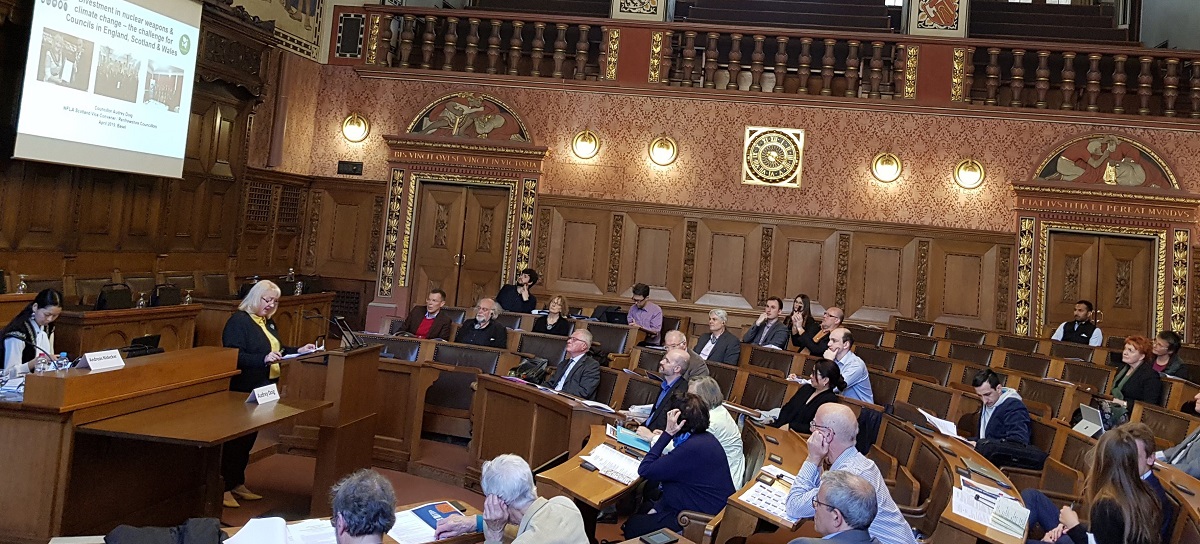[Cover photo: HMS Victorius in the Firth of Clyde].
Clyde Naval Base in Faslane, Scotland, is home-base for the UK nuclear weapons fleet (nuclear armed submarines). The Scottish parliament, government and the majority of Scottish people are opposed to this. Now a new campaign to challenge the UK nuclear arms race is gathering momentum – nuclear weapons divestment.
Three city councils in Scotland have this year adopted resolutions supporting divestment of city pension funds from the nuclear weapons industry. In addition, members of the Scottish Parliament are pushing for divestment of the Scottish Parliamentary Contributory Pension Fund from nuclear weapons.
Scottish City Council divestment resolutions
On 9 May 2019, Renfrewshire Council became the first Scottish city to adopt such policy, calling on the Strathclyde Pension Fund, which manages the pension contributions of Renfrewshire Council employees, to “Work towards eliminating current and future financial exposure to companies that are involved in the production or maintenance of nuclear weapons and their delivery systems, giving due regard to fiduciary duty.’
The resolution highlighted that ‘Strathclyde Pension Fund is known to hold shares in companies that are involved in the production or maintenance of nuclear weapons or their delivery systems, including some that undertake work on the UK’s nuclear weapons programme.’
‘In what is a dangerous and unstable world, it is really important that Councils stand up for doing things differently and encourage multilateral nuclear disarmament and divestment from companies involved in developing the ultimate weapon of mass destruction,’ said Renfrewshire Councillor Audrey Doig, author of the resolution and Executive Member of Nuclear Free Local Authorities Scotland. ‘By such actions we help to solve the ‘nuclear emergency.’

Councillor Audrey Doig, author of the Renfrewshire City nuclear weapons divestment resolution, speaking at a nuclear weapons and fossil fuel divestment conference in the Basel Town Hall, Switzerland.
On 29 May 2019, West Dunbartonshire, whose city pension funds are also managed by Strathclyde Pension Fund, adopted a resolution that calls on the Pension Fund to divest from fossil fuels and nuclear weapons. The resolution, the first draft of which focused only on fossil fuel divestment, is part of a Scottish campaign for City Council divesment from fossil fuels led by Friends of the Earth, and the Divest Strathclyde, which focuses specifically on the Strathclyde Pension Fund. The addition of nuclear weapons divestment to the city council resolution is an example of increased cooperation between fossil fuel and nuclear weapons divestment campaigns.
‘We have clearly demonstrated our concerns, for our safety, health, environment, the global food chain, for future generations and their cultural inheritance,’ said West Dunbartonshire Councillor Ian Dickson. ‘West Dunbartonshire doesn’t need or want these ‘Nukes of Hazard’ passing through our local areas. These weapons of mass destruction are travelling far too close for comfort to our homes, schools, and workplaces and this motion reasserts that they are not wanted on our soil in West Dunbartonshire.’
On 26 June 2019, Midlothian Council passed a resolution calling on the Lothian Pension Fund, which manages their city employee pensions, to divest from nuclear weapons.
‘I am delighted that Edinburgh and Midlothian Councils have passed strongly worded resolutions calling for multilateral nuclear disarmament and divestment from shares in companies involved in producing nuclear weapons,’ said Glasgow City Councillor Feargal Dalton, Convenor of Nuclear Free Local Authorities Scotland. ‘They send out a strong message that local government wants to see real change to bring about a safer world.’
[Editors’ note: Edinburgh adopted a resolution supporting the Treaty on the Prohibition of Nuclear Weapons, but has not yet adopted policy on nuclear weapons divestment].
Councillor Dalton understands well the risks of nuclear weapons having served previously as a naval officer with command of a military submarine armed with live nuclear warheads. In an interview with The Times in January 2017, Mr Dalton noted that he opposed nuclear armament, but if he had been ordered to fire a missile he would have done so. (I hate Trident but would have pulled the trigger, The Times, Jan 29, 2017).

Councillor Feargal Dalton, Convenor of Nuclear Free Local Authorities Scotland.
The nuclear weapons divestment campaign in Scotland is being led by Don’t Bank on the Bomb Scotland and UK Nuclear Free Local Authorities, and promoted by a number of other organisations including Parliamentarians for Nuclear Non-proliferation and Disarmament.
For further background see Stop Funding the End of World: A guide to nuclear weapons divestment in Scotland published by Don’t Bank on the Bomb Scotland.
Response of Pension Funds
Depsite the growing campaign for city council divestment from fossil fuels and nuclear weapons, the Strathclyde and Lothian Pension Funds have been reluctant to exclude these industries from their investment portfolios.
The policy of Strathclyde is ‘to not seek to influence our managers’ investment portfolios but rather act as an active owner and engage in depth with portfolio companies in regard to international norms. We believe this approach is better aligned with the fiduciary duty and protection of value and ultimately more responsible than an ethical or values based exclusion policy.’
The policy of Lothian is to implement ‘its fiduciary duty to its members and employers…rather than by purely ethical considerations. Accordingly, the Fund does not disinvest from companies for purely non-financial reasons, not least because this could lead to legal challenge.’ The Fund does take into consideration environmental, social and governance (ESG) issues, but only as they ‘affect the financial performance of the companies in which it invests.’

